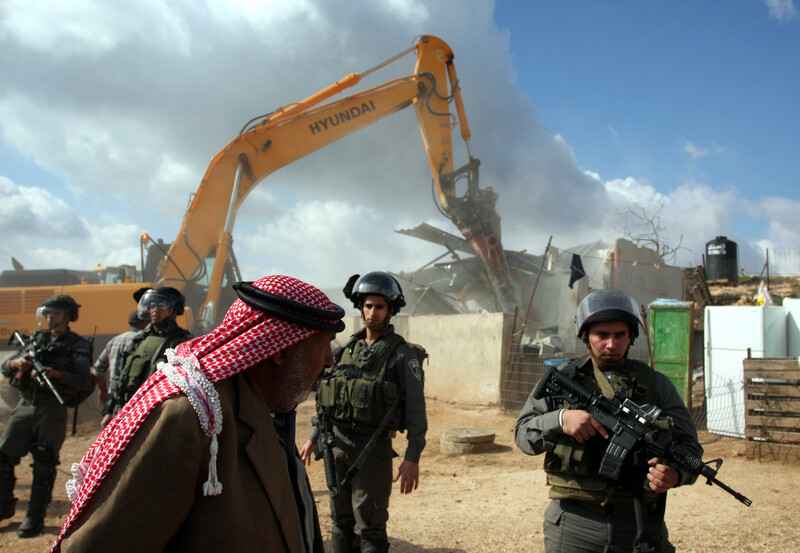Rights and Accountability 8 February 2012

Israeli forces destroy structures belonging to a Bedouin family in the Beit Hanina neighborhood of East Jerusalem, November 2011.
APA imagesIn a briefing paper issued today, Amnesty International stated that the Israeli military must cancel plans to forcibly transfer more than 2,000 Bedouin residents to an area besides the Jerusalem municipal garbage dump.
The Electronic Intifada published a report yesterday on Israel’s plans to relocate Bedouin communities who have lived for decades in the so-called “E1” area of the West Bank lying between Maale Adumim — one of the largest settlement blocs in the West Bank — and occupied East Jerusalem.
Most of the Bedouins in the affected communities are from the Jahalin tribe, originally from the Naqab (Negev) desert, who were ethnically cleansed from their ancestral land after the establishment of the State of Israel 1948 and resettled in the West Bank.
The plans to relocate the Jerusalem-area Bedouin communities are part of a larger scheme to expel approximately 27,000 Bedouins from Area C of the occupied West Bank.
Following the Oslo accords, the occupied West Bank and Gaza Strip were carved up into areas A, B and C — the latter indicating full Israeli military and administrative control. Approximately 60 percent of the West Bank is designated “Area C”
Not only are Bedouin communities in the West Bank facing displacement, but Israel plans to transfer 30,000 Bedouins in the Naqab desert.
The Electronic Intifada reported last October:
“The same thing they are doing with the people in the Naqab, they are doing with us here. But in the Naqab, the Bedouins there have Israeli nationality, and here we are Palestinian. The Israelis don’t want any Bedouins in the land,” [Jahalin Bedouin tribe member Suleiman] Mazarah said. “Our condition, and their condition also, is very bad. These forgotten people are suffering from the forced displacement, and it’s destroying their lives.”
Amnesty: Ehud Barak must cancel transfer plans
Amnesty called on Israeli Minister of Defense Ehud Barak today to immediately halt all demolitions in the twenty Bedouin communities affected by the garbage dump relocation plan, saying that verbal promises made last week by Israeli military officials to not implement pending demolition orders “are insufficient.”
Amnesty describes the dump which the government planned to relocate the Bedouin communities next to:
According to the Israeli Ministry of Environmental Protection, the dump receives up to 1100 tons of garbage per day, most of it from Jerusalem. The ministry has stated that the dump site creates air pollution, ground pollution, and possible water contamination, is improperly fenced-off, and poses a “danger of an explosion and fires” due to untreated methane gas produced by the decomposition of garbage.
Although disposal of waste at the site is due to cease later this year, no rehabilitation plan has been agreed, which means that the environmental hazards will likely remain for years.
Amnesty added that Israeli officials have not explained why Israel can provide electricity and water networks to its illegal settlements but not longstanding Bedouin communities.
Amnesty adds:
The 20 Bedouin communities have created a “protection committee” to coordinate their response to the displacement plan. The committee’s stated preference would be to return to their lands in Israel’s Negev desert from which they were displaced by the Israeli authorities in the 1950s, in accordance with their internationally recognized right to return.
The Bedouin communities say that their second option would be for Israeli authorities to recognize their rights to remain in their current homes, connect them to water, electricity and road networks, and lift arbitrary restrictions on their movement. Due to these restrictions, many Bedouin must buy animal fodder for sheep and goats that they were formerly able to graze, forcing them to sell their livestock.
As the final option, the Bedouin would be willing to negotiate the possibility of relocating again, if the Civil Administration treated them as equal negotiating partners.
Major-General Eitan Dangot, Coordinator of Government Activities in the Territories, visited the Khan al-Ahmar community last week, and reportedly promised residents that that their homes and community school would not be demolished, and that they would not be transferred to the site next to the garbage dump. He said that the community would be moved to a different site in the occupied West Bank.
But Amnesty International said that was not enough.
“Israeli military officials are putting a gloss on their plans by portraying them as a way of providing Bedouin with basic amenities such as water and electricity, but in fact such forcible relocation of Bedouin would merely perpetuate years of dispossession and discrimination and could constitute a war crime,” said Ann Harrison.
“Informal promises are not enough for these communities. The Israeli Minister of Defence must issue a formal cancellation of this policy.”
Download Amnesty International’s briefing paper: “Stop the transfer: Israel about to expel Bedouin to expand settlements”





